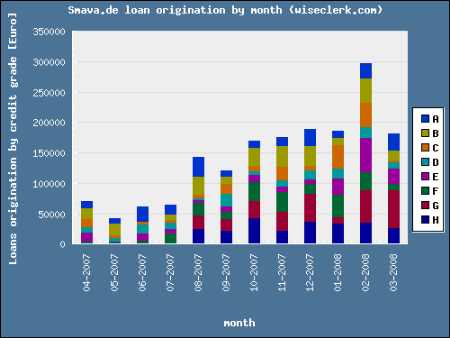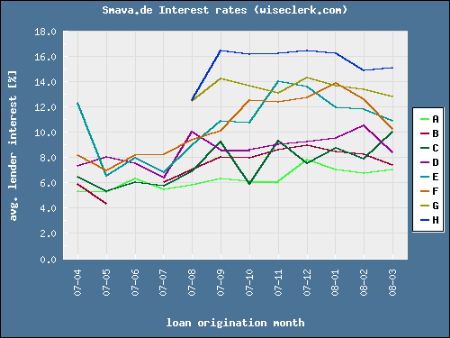Dutch Boober which announced and worked on entering the German p2p lending market for over a year (see earlier coverage) apparently dropped that plan.
Source: P2P-Kredite.com
Dutch Boober which announced and worked on entering the German p2p lending market for over a year (see earlier coverage) apparently dropped that plan.
Source: P2P-Kredite.com
German p2p lending service Smava.de launched one year ago. Since the launch of Smava 393 loans were funded for a total loan volume of about 1.7 million Euro (approx. 2.6 million US$).
Lender’s viewpoint
In a february survey 33% of lenders answered to be very satisfied with Smava and 63% were satisfied. 48% said their ROI met expectations while 19% said it exceeded expectations.
So far a 7% ROI is realistic. Only 3 loans have defaulted and 11 are (less then 30 days) late. In the past Smava cured the majority of late loans. The Anleger-Pool mechanism spreads the losses of a default across all loans of a credit grade. Therefore when 1 in 100 loans in credit grade X defaults, the lenders invested in the defaulted loan still receive 99% of the principal, while for lenders in the current loans returns are lowered by 1%.
Technically and on the process level Smava functions as promised.
Borrower’s viewpoint
Provided the borrower has a credit grade of at least ‘H’ (95% of the German population have credit grades between ‘A’ and ‘H’ so about 5% are excluded) and he has a sufficient income, chances for obtaining a loan through Smava are good. About two third of the listings were funded. The fee of 1% of the loan amount that Smava charges borrowers is low.
Marketplace development
Smava’s growth has picked up in the last month (see chart).

(Source: smava loan stats, Wiseclerk.com, 03-21-08)
So far Smava has not reached a broad appeal. While press release state 25,000 registered users, only 650 have invested money and roughly 450 wrote a loan listing. Looking at the distribution of lenders by amount invested, the top 50 Smava lenders funded about 700,000 Euro (or about 40% of total loan volume). Currently lenders are limited to a maximum of 25,000 Euro investment.
Attracting new borrowers has been the bottleneck for Smava’s growth so far. An increase of money supply by lenders with no matching demacnd increase led to slightly falling average interest rates in the last weeks (see chart). Before rates increased, especially for credit grade ‘F’ caused by sharpened risk awareness following several late payments.

(Source: smava loan statistic, Wiseclerk.com, 03-21-08)
Smava charges borrowers a fee of 1% of the loan amount. There are no fees for lenders. Total revenue of Smava in the first year therefore was 17,000 Euro (1% von 1.7 million Euro). Prosper, Lendingclub and Zopa have much bigger p2p lending volumes per year. Boober‘s loan volume in the Netherlands is about the same size as Smava’s but in a market with only one fifth the size (by inhabitants). First priority of Smava must be to accelerate growth.
German p2p lending service Smava.de yesterday introduced an optional insurance for borrowers. Borrowers can take out an insurance together with their loan. In the case of death, disability or unemployment (through no fault of one's own), the insurance will pay the repayments. To offer the residual debt insurance (see a definition of residual debt insurance), Smava partnered with an insurance company. The costs for the insurance paid by the borrower are:
It will be interesting to see how many borrowers are willing to opt in to the insurance.
Lenders profit because this lowers the default risk. Unfortunately at the moment lenders can not on a borrower's loan listing whether the borrower selected insurance or not.
11 months after launch defaults at Smava are still rare. Only 3 of 368 loans have defaulted and only 2 are currently late. A chart shows the development of the Smava interest rates since start.
German startup Valuna.de wants to help companies to raise capital through loans from private investors without a bank. The first offer is by printing service QuickPrinter which offers 15 percent interest for a 7 year 100,000 Euro loan. Minimum amount for investors is 100 Euro. The platform Valuna offers marketing, but does not handle the financial transactions which are conducted directly between the lenders and the company. More information in an detailed article on the Valuna launch (German language).
As P2P-Kredite.com reports the first 2 loans at German p2p lending service Smava.de have defaulted. Since the Start in March 2007 a loan volume of 1 million Euro (approx. 1.4 million US$) has been funded at Smava. The amounts of the two defaulted loans are 4,000 and 6,000 Euro resulting in a default rate of about 1%. At Smava loans default 40 days after they are late and are sold in a debt sale for a fixed rate of 25% (22% on lowest credit grades) to a collection agency.
2007 has been a very good year for Smava lenders as defaults (and late payments) have been significantly below expected rates.
In Germany at least four companies developed an approach that makes use of the media hype on buzz words like peer-to-peer lending or social lending.
Under the headline peer-to-peer lending they offer kind of a "dating platform" for borrowers and potential lenders. To attract borrowers they offer hope – even borrowers with bad credit history have the chance to get a loan. To the lender they promise high rates. But a close examination of these services reveals that one could just as good publish a classified in a paper to seek or offer a loan. The services do nothing but store the requests in a database, match them and inform both sides by email once a match was made. It is then up to the borrower and the lender to negotiate the loan terms, a contract, handle the money transfer and the repayments. Since they are not handling the money, the services are not regulated by German regulator Bafin.
Oh I forgot, the services do something else: they (at least 3 of the 4 I am aware of) charge the borrower a registration fee of about 9.50 Euro (approx. 6.75 US$). Note that the fee is not tied to a successful loan match but payable upon registration.
No wonder a German consumer protection agency cautioned against the use of offers like these. Calling it peer-to-peer lending might not technically be a false claim, but these services are worlds apart from comprehensive services like Zopa, Prosper and Smava.
P.S.: No I did not name the companies here in order not to give them more free traffic. The media already did that enough, because they often do not research enough.